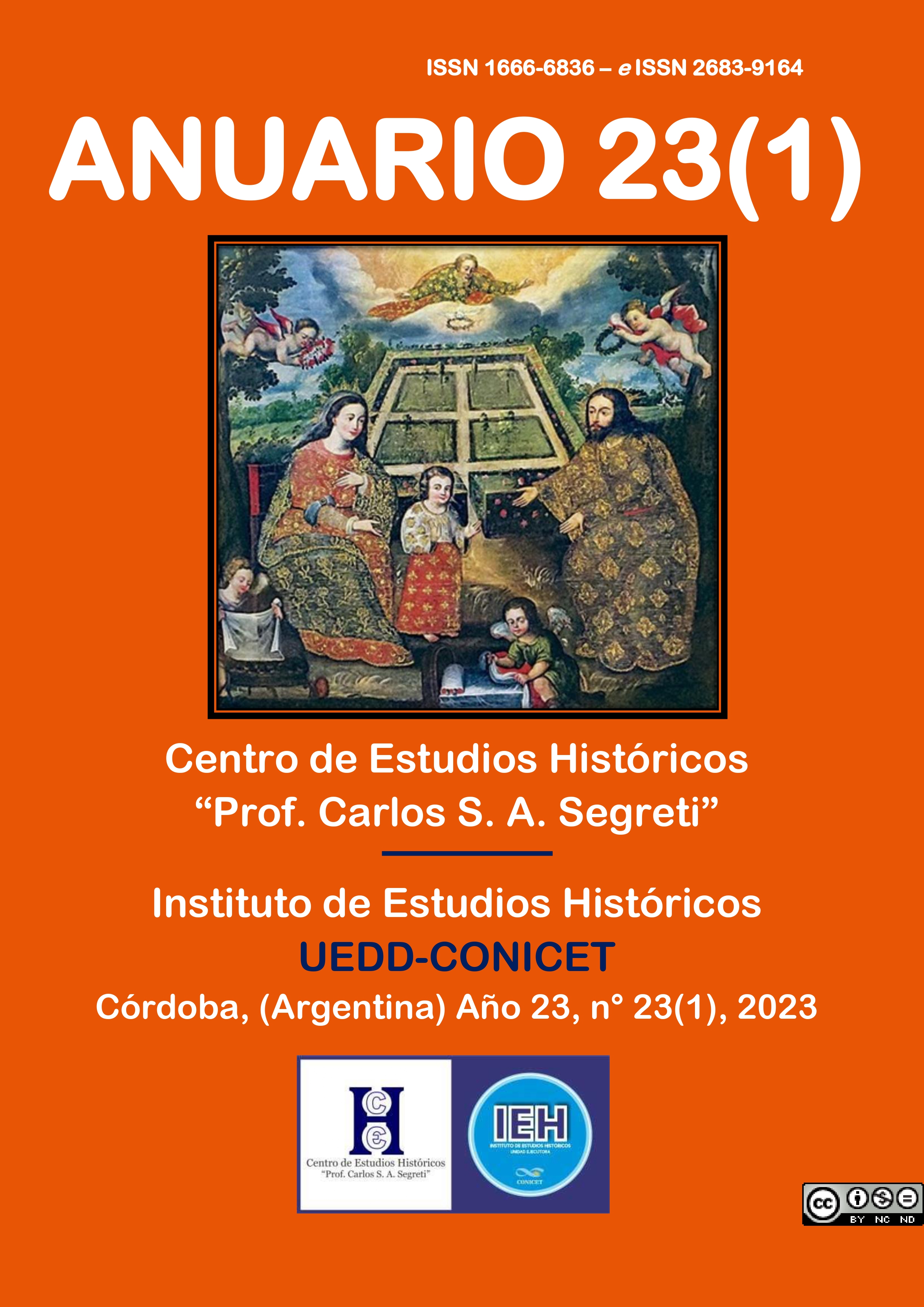CANCELLATION OR SUCCESS? The Future of the Velluters Guild Apprentices in Valencia, 1570-1592
DOI:
https://doi.org/10.52885/2683-9164.v1.n23.41778Keywords:
apprentices,, silk weavers, Valencia, mastershipAbstract
The guild apprenticeship was one of the best options in the labour market of the Ancien Régime.
However, this option could also be considerably unstable for many of the young people who could
not move up in the artisan career. This study analyses the future of apprentices in the silk weavers’
guild in the city of Valencia in the last third of the 16th century. Through the apprenticeship
contracts, not only the model apprentice will be traced, but also the socio-professional profile
of those young people who cancelled their contracts, as well as those who managed to become
masters. The analysis of these data will show that the sons of masters were not the majority
group, but also that they were not the only ones to obtain the mastership. In this way, not only
the supposed endogamic character of the guilds in the Ancien Régime will be clarified, but also
the importance of the economic situation in which the guilds, and therefore their members, were
immersed will be made clear.
Downloads
References
BAIXAULI JUAN, Isabel Amparo, Els artesans de la València del segle XVI. Capítols dels oficis y col·legis, Valencia, Universitat de València, 2006.
DE MUNCK, Bert “From brotherhoom community to civil society? Apprentices between guild, household and the freedom of contract in early modern Antwerp”, Social History, núm. 35-1, 2010, pp. 1-20.
DE MUNCK, Bert, Guilds, labour and the urban body politic. Fabricating community in the Southern Netherlands, 1300-1800, Nueva York, Routledge, 2018.
DE MUNCK, Bert, Technologies of learning: apprenticeship in Antwerp guilds from the 15th century to the end of the Ancien Régime, Turnhout, Brepols Publishers, 2017, p. 161.
DIEZ, Fernando, Viles y mecánicos. Trabajo y sociedad en la Valencia preindustrial, Valencia, Edicions Alfons el Megnànim, 1990.
EPSTEIN, Stephan R. y PRAK, Maarten, Guilds, innovation and the European economy, 1400-1800, Cambridge, Cambridge University Press, 2008.
EPSTEIN, Stephan R., “Craft guilds, apprenticeship and technological change in preindustrial Europe”, The Journal of Economic History, núm. 58-3, 1988, pp. 684-713.
FARR, James, Artisans in Europe, 1300-1914, Cambridge, Cambridge University Press, 2000.
FRANCH BENAVENT, Ricardo, “La seda en la Valencia moderna: de la expansión productiva y manufacturera del siglo XVI al periodo de esplendor del siglo XVIII”, FRANCH BENAVENT, Ricardo y NAVARRO ESPINACH, Germán (eds.), Las rutas de la seda en la historia de España y Portugal, Valencia, Publicacions de la Universitat de València, 2017, pp. 129-161.
FRANCH BENAVENT, Ricardo, MUÑOZ NAVARRO, Daniel y ROSADO CALATAYUD, Luis, “La reproducción de los maestros y la transformación de las condiciones sociales de los miembros del Colegio del Arte mayor de la Seda de Valencia en el siglo XVIII”, Revista de Historia Industrial, núm. 65, 2016, pp. 15-49.
FRANCH BENAVENT, Ricardo, MUÑOZ NAVARRO, Daniel y ROSADO CALATAYUD, Luis, “El gremio de velluters de Valencia, 1479-1600. La apertura del mercado laboral como factor de dinamismo”, SOLÀ PARERA, Àngels (ed.), Artesanos, gremios y género en el sur de Europa (siglo XVI-XIX), Barcelona, Icaria Editorial, 2019, pp. 101-126.
FRIEDRICHS, Christopher R., “Capitalism, mobility and class formation in the early modern German city”. Past & Present, núm. 69, 1975, pp. 24-49.
GONZÁLEZ ENCISO, Agustín, “Los gremios y el crecimiento económico”, Memoria y Civilización, núm. 1, 1998, pp. 111-137.
GONZÁLEZ FONS, Paula, “Aprenentatge i mercat laboral. El cas del gremi de velluters de València, 1570-1592”, Estudis: Revista de Historia Moderna, núm. 48, 2022, pp. 123-143.
KAPLAN, Steven L, y KOEPP, Cynthia J., Work in France. Representation, meaning, organization, and practice, Cornell, Cornell University Press, 1986.
KRAUSMAN BEN-AMOS, Ilana, “Failure to become a freemen: urban apprentices in early modern England”, Social History, núm. 16-2, 1991, pp. 155-172.
LEUNIG, Tim, MINNS, Chris y WALLIS, Patrick, “Networks in the premodern economy: the market for London apprenticeships, 1600-1749, Journal of Economic History, núm. 71-2, 2011, pp. 413-443.
LUCASSEN, Jan, DE MOOR, Tine y VAN ZANDEN, Jan Luiten, The return of the guilds, Cambridge, Cambridge University Press, 2008.
MUÑOZ NAVARRO, Daniel, y FRANCH BENAVENT, Ricardo, “El artesanado sedero y las fluctuaciones del mercado laboral en la Valencia preindustrial (1479-1836)”, Investigaciones de Historia Económica-Economic History Research, núm. 17, 2021, pp. 16-28.
NARBONA VIZCAÍNO, Rafael, “Oficios y conversos ante la Germanía de Valencia (1458-1519), En la España medieval, núm. 42, 2019, pp. 35-57.
NAVARRO ESPINACH, Germán, “Las ordenanzas más antiguas de velluters¸1479-1491”, Consorci de Museus de la Comunitat Valenciana, L’art dels velluters. Sedería de los siglos XV-XVI, Valencia, Generalitat Valenciana, 2011, pp. XXIII-XLVIII.
NAVARRO ESPINACH, Germán, El privilegi del rei Ferran II per a l’Art de Velluters de València, 1479, Valencia, Impresum, 2016.
NAVARRO ESPINACH, Germán, Los orígenes de la sedería valenciana. Siglos XV-XVI, Valencia, Colección “Estudis”, 1999, pp. 135-157.
NIETO, José A. y ZOFÍO, Juan Carlos, “Los gremios de Madrid durante la Edad Moderna: una revisión”, Áreas. Revista Internacional de Ciencias Sociales, núm. 34, 2015, pp. 47-61.
NIETO, José A., “El acceso al trabajo corporativo en el Madrid del siglo XVIII: una propuesta de análisis de las cartas de examen gremial”, Investigaciones de Historia Económica, núm. 9, 2013, pp. 97-107.
NIETO, José A., “Madrid como centro consumidor, productor y redistribuidor de tejidos de seda en la Edad Moderna”, FRANCH BENAVENT, Ricardo y NAVARRO ESPINACH, Germán (eds.), Las rutas de la seda en la historia de España y Portugal, Valencia, Publicacions de la Universitat de València, 2017, pp. 245-274.
OGILVIE, Sheilagh, “Guilds, efficiency and social capital: evidence from German proto-industry”, Economic History Review, núm. 57, 2004, pp. 286-333.
PÉREZ GARCÍA, Pablo, “La Germanía, quinientos años después”, ARCINIEGA GARCÍA, Luis (comp.), Reflexiones históricas y artísticas en torno a las Germanías de Valencia, Valencia, Universitat de València, 2020, pp. 17-86.
SALVADOR ESTEBAN, Emilia, “La Germanía de Valencia: una aproximación interpretativa”, SÁNCHEZ-MONTES, Francisco, y CASTELLANO, Juan Luis (comps.), Carlos V. Europeísmo y universalidad, Madrid, Sociedad Estatal para la Conmemoración de los Centenarios de Felipe II y Carlos V, 2001, vol. 2, pp. 537-552.
SCHALK, Ruben, et.al., “Failure of Flexibility? Exits from apprenticeship training in pre-modern Europe”, Economic History Working Papers, núm. 252, 2016, pp. 1-37.
SOLÀ, Àngels y YAMAMICHI, Yoshiko, “Del aprendizaje a la maestría. El caso del gremio de velers de Barcelona, 1770-1834”, Áreas. Revista Internacional de Ciencias Sociales, núm. 34, 2015, pp. 77-91.
STABEL, Peter, “Social mobility and apprenticeship in late medieval Flanders”, DE MUNCK, Bert, KAPLAN, Steven L. y SOLY, Hugo (eds.), Learning on the shop floor, Nueva York, Bergham Books, 2007, pp. 158-178.
STEIDL, Annemarie, “Silk waver and purse maker apprentices in eighteenth- and nineteenth-century Vienna”, DE MUNCK, Bert, KAPLAN, Steven L., y SOLY, Hugo (eds.), Learning on the shop floor, Nueva York, Bergham Books, 2007, pp. 133-157.
VAN DER WEE, Herman, The Rise and decline of urban industries in Italy and Low Countries, Leuven, Leuven University Press, 1998.
WALLIS, Patrick, WEBB, Chris y MINNS, Chris, “Leaving home and entering service: the age of apprenticeship in early modern London”, Continuity and Change, núm. 25-3, 2011, pp. 377-404.
Downloads
Published
Issue
Section
License
Copyright (c) 2023 Paula González Fons

This work is licensed under a Creative Commons Attribution-NonCommercial-NoDerivatives 4.0 International License.
Aquellos autores/as que tengan publicaciones con esta revista, aceptan los términos siguientes:
- Los autores/as conservarán sus derechos de autor y garantizarán a la revista el derecho de primera publicación de su obra, el cuál estará simultáneamente sujeto a una Licencia de reconocimiento de Creative Commons. Se puede compartir, copiar, distribuir, ejecutar y comunicar públicamente la obra, siempre que: a) se cite la autoría y la fuente original de su publicación (revista, editorial y URL de la obra); b) no se use para fines comerciales; c) no se altere, transforme o genere una obra derivada a partir de esta obra.
- Los autores/as podrán adoptar otros acuerdos de licencia no exclusiva de distribución de la versión de la obra publicada (p. ej.: depositarla en un archivo telemático institucional o publicarla en un volumen monográfico) siempre que se indique la publicación inicial en esta revista.
- Se permite y recomienda a los autores/as difundir su obra a través de Internet (p. ej.: en archivos telemáticos institucionales o en su página web) después del proceso de publicación, lo cual puede producir intercambios interesantes y aumentar las citas de la obra publicada. (Véase El efecto del acceso abierto).









